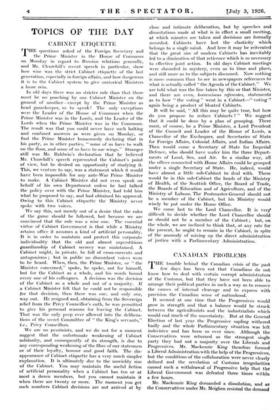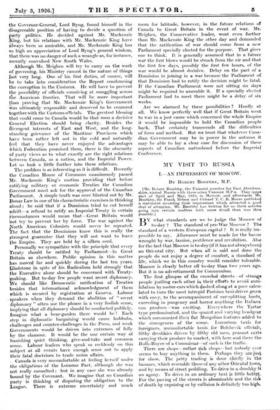CANADIAN PROBLEMS
THE trouble behind the Canadian crisis of the past few days has been not that Canadians do not know how to deal with certain corrupt administrators of the Customs, but that they have not been able to arrange their political parties in such a way as to remove the causes of internal cleavage and to express with precision the Canadian sense of nationhood.
It seemed at one time that the Progressives would grow in strength and that a balance would be struck between the agriculturists and the industrialists which would end much of the uncertainty. But at the General Election of last year the Progressive sapling withered badly and the whole Parliamentary situation was left indecisive and has been so ever since. Although the Conservatives were returned as the strongest single party they had not a majority over the Liberals and Progressives. Mr. Mackenzie King therefore formed a Liberal Administration with the help of the Progressives, but the conditions of the collaboration were never clearly defined and the revelation of Customs irregularities caused such a withdrawal of Progressive help that the Liberal Government was defeated three times within a few hours.
Mr. Mackenzie King demanded a dissolution, and as the Conservatives under Mr. Meighen resisted the demand the Governor-General, Lord Byng, found. himself in the iilisagreeable position of having to decide a question of patty politics. He. decided against Mr. Mackenzie King, but his relations with Mr. Mackenzie King have iiiways been so amicable, and Mr. Mackenzie King has so high an appreciation of Lord Byng's general wisdom, that there was no danger of such a wrangle as, for instance, recently convulsed New South Wales.
Although Mr. Meighen will try to carry on the work of governing, his Ministry cannot in the nature of things last very long. One of his first duties, of course, will be to take into consideration the Report condemning the corruption in the Customs. He will have to prevent the possibility of officials, conniving at smuggling across the American frontier. That will be more important lian proving that Mr. Mackenzie King's Government was ultimately responsible and deserved to be censured together with the Customs officials. The greatest blessing that could come. to Canada would be that soon a decisive General Election should bring clarity. Besides the Ilivergent interests of East and West, and the long- standing grievance of the Maritime Provinces which have been rather left out in the cold and naturally feel that they have never enjoyed the advantages ; which Federation promised them, there is the obscurity Of party views as to what exactly are the right relations between Canada, as a nation, and the Imperial Power. Let us look a little further into these relations.
The problem is as interesting as it is difficult. Recently the Canadian House of Commons unanimously passed Mr. Mackenzie King's motion providing that before ratifying military or economic Treaties the Canadian Government must ask for the approval of the Canadian parliament. A simple truth was once blurted out by Mr. Boner Law in one of his characteristic exercises in thinking aloud ; he said that if a Dominion 'tried to cut herself -adrift—a refusal to ratify an Imperial Treaty in certain Circumstances would mean that—Great Britain would 'not try to prevent her by force. The war against the r orth American Colonists would never be repeated. The fact that the Dominions know this is really the ptrongest guarantee that they will not want to leave the Empire. They are held by a silken cord.
Personally we sympathize with the principle that every k!reaty should be ratified by Parliament—in Great Britain as elsewhere. Public opinion in this matter has moved far and quickly during the last ten years. pladstone in spite of his Radicalism held strongly that he Executive alone should be concerned with Treaty- Vraking. But to-day few people want secret diplomacy. e should like Democratic ratification of Treaties besides that international acknowledgment of them which is secured by registration at Geneva. Labour • speakers when they demand the abolition of "secret diplomacy " often use the phrase in a very foolish sense, implying that all diplomacy should be conducted publicly. Imagine what a bear-garden there would be ! Each step in diplomatic bargaining would cause hubbubs, challenges and counter-challenges in the Press, and weak governments would be driven into extremes of folly by the clamour. It would be the one certain way of banishing quiet thinking, give-and-take and common sense. Labour leaders who speak so recklessly on this subject at all events have enough sense not to apply their fatal doctrines to trade union affairs.
-• Canada is very uncomfortable at feeling herself under the obligations of the Locamo Pact, although she was not really consulted ; -but in any case she was already bound by the Covenant. We imagine that no Canadian party is thinking of disputing the obligation to the League. There is extreme uncertainty and much room for latitude, however, in the future relations of Canada to Great Britain in the event of war. Mr. Meighen, the Conservative leader, went even further than Mr. Mackenzie King the other day and demanded that the ratification of war should come from a new Parliament specially elected for the purpose. That gives one to think. It is generally assumed that in a future war the first blows would be struck from the air and that the first few days, possibly the first few hours, of the war would be almost decisive. Delay on the part of a Dominion in joining in a war because the Parliament of that Dominion had to ratify the decision might be fatal. If the Canadian Parliament were not sitting six days might be required to assemble it. If a specially elected Parliament had to meet there might be a delay of six weeks.
Are we alarmed by these possibilities ? Hardly at all. We know perfectly well that if Great Britain went to war in a just cause which concerned the whole Empire it would be impossible to hold the Canadian people back. That certainty transcends all the difficulties of form and method. But we trust that whatever Cana- dian Government may be in power in the autumn it may be able to lay a clear case for discussion of these aspects of Canadian nationhood before the Imperial Conference.











































 Previous page
Previous page